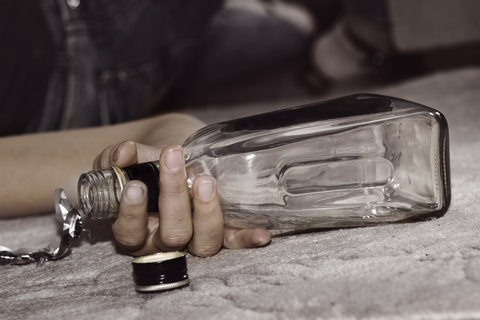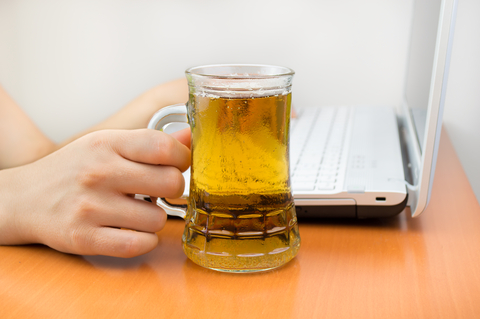For decades, the idea of alcoholism being a “moral failing” persisted. According to this view, if you drink too much, there must be something wrong with you. This antiquated view creates a lot of shame, and it tends to encourage people to avoid looking at their relationship with alcohol in more realistic terms. This blog post talks about drinking problems in a non-shameful way and identifies 5 signs that your drinking might be a problem.
"Alcoholic" or Something Else
Historically, drinking problems were called “alcoholism” and you were an “alcoholic” if you had a problem with alcohol. And the “only” way to “recover” was to stop drinking completely.
Drinking Problems as a Spectrum
In the past, alcohol has been viewed as all or nothing; either you’re an alcoholic or you’re not. But viewing alcohol in this way isn’t the full story. Instead, like many other things, we’ve learned that drinking problems are a spectrum. In fact, it’s more about a person’s relationship with alcohol than it is about how much someone drinks.
Therefore, someone who shows all the typical signs of being “an alcoholic” would fall on a spectrum. But a person who drinks occasionally and then ends up missing work the next day from being hungover would also fall on the spectrum. Also, someone who drinks regularly but doesn’t have negative consequences from their drinking might not fall on this spectrum.
Signs of Problem Drinking
This list highlights a few of the more common signs your drinking has become a problem. It is not a complete list. If you think your drinking might be a problem, please talk to your doctor or a therapist.
Recovery Time
One sign of drinking problems involves the amount of time you spend recovering from alcohol. This recovery time differs for everyone. As an example, one person may struggle to wake up the next morning, but they’re fine the rest of the day. Other people might be feeling sick or have a headache the entire day after drinking.

Recovery time also includes the time you spend waiting for the direct effects of alcohol to wear off. For example, someone might decide to wait out the effects of alcohol so they can drive home. Obviously, this will take time.
Relationship Problems
Sometimes, drinking problems manifest as relationship problems. These problems obviously range from more mild relationship problems to the most severe. For example, your partner may disapprove of how much you drink or how much time you spend drinking. On the opposite end of the spectrum, your drinking might result in aggressive or violent behavior towards your partner.
Alcohol can also interfere with intimate relationships. You often feel like you’ perform better when intoxicated. But in reality, it can impair your ability to climax or stay aroused.
Risky Behaviors
Some people who have drinking problems start to engage in risky behaviors. Examples of risky behaviors include unprotected sex, criminal acts, and self-injurious behavior.
However, driving while intoxicated is the most common risky behavior associated with alcohol. Drunk driving carries severe consequences, whether from the cost of a DUI charge/conviction or the loss of life in an alcohol related accident.
Money Problems
Alcohol typically isn’t cheap. Therefore, money problems can be a sign that your drinking is a problem. For example, you might find that you spent too much money on alcohol and you can’t pay your bills now. Or you’re not able to save money because all of your expendable income goes towards drinking or drinking related events.
Alcohol also creates money problems in other ways. These can stem from the previously mentioned risky behaviors. DUI charges typically cost anywhere between $5,000 to $15,000. Additionally, if your high risk behaviors include gambling, you might lose significant amounts of money to your bets.
Lying

Lying is our final sign of this list. It takes on many different forms when alcohol is involved. For example, you might lie about how much or how often you drink. You might lie about whether you’re drunk or not. And you might even lie about engaging in risky behaviors.
People often view lying as a malicious behavior. However, in this case at least, lying serves other purposes. Many people with problems with alcohol lie to avoid being labeled an alcoholic. Others lie to insulate themselves from the negative consequences of their actions. Regardless, lying to others doesn’t help you overcome your drinking problems.
Causes of Drinking Problems
American society has had rather shameful views of alcohol problems for over a century. If you have a drinking problem, this view argues, you lack the moral fortitude needed to drink “right.” Or your drinking problem is because of a disease that makes it so you can never have a healthy drink again.
The causes for problematic alcohol use vary for each person. As an example, you might be going through a difficult time in your life and alcohol is your comfort. You might have friends that expect you’re going to “get shitfaced” every time you’re together. However, alcohol problems are not because there’s something wrong with you as a person.
Final Thoughts
While historically, alcohol problems were measured by the amount of alcohol you drink. Now, however, drinking problems are measured more by the impact on your life than how much you drink. If you find that your drinking is creating difficulties in any way, it’s worth having a chat with your doctor or a therapist.





